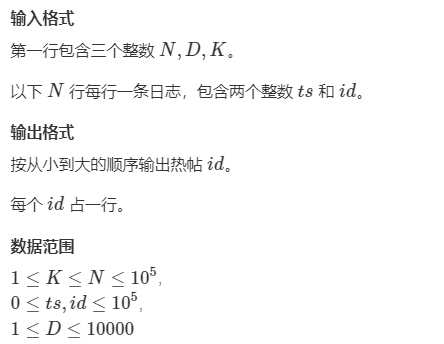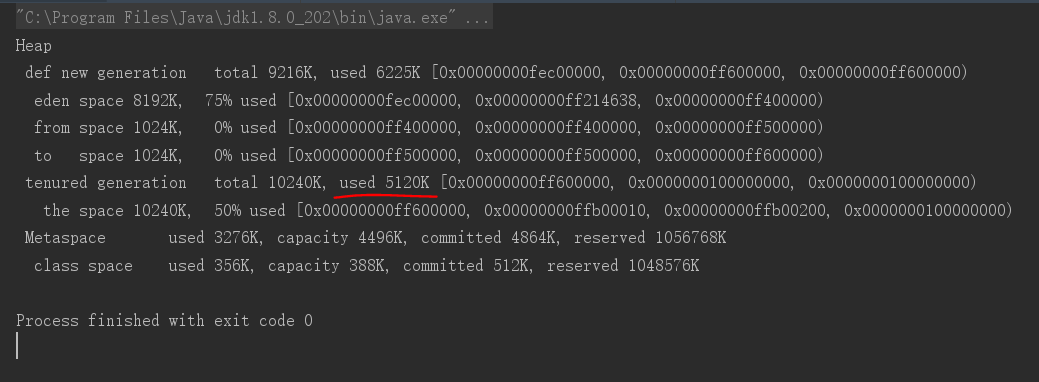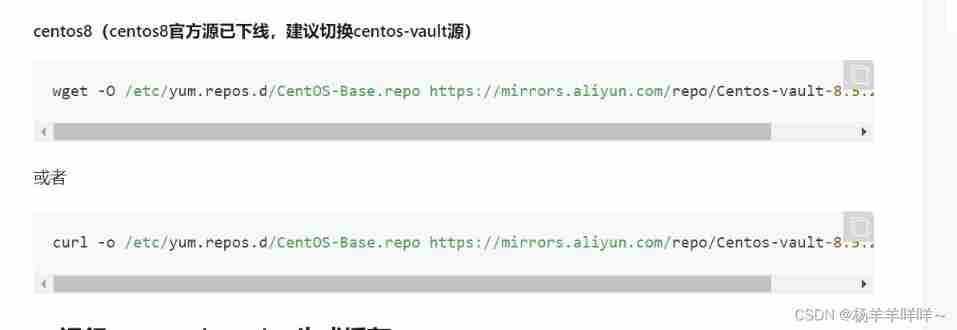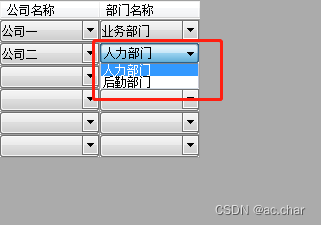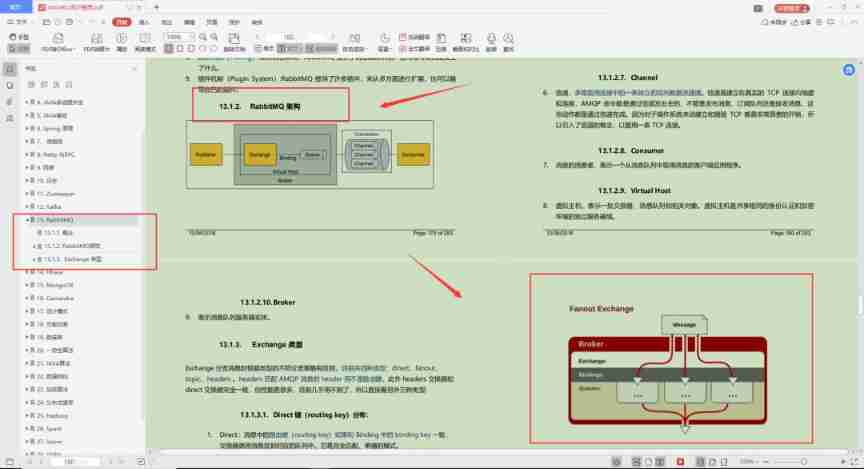Reptile battle ( 5、 ... and ): Climb Douban top250
One 、 Website analysis
1、 Page analysis
Through packet capturing analysis , Available data is not dynamically loaded , But static pages , So we can send the request directly to the page , You can get the data
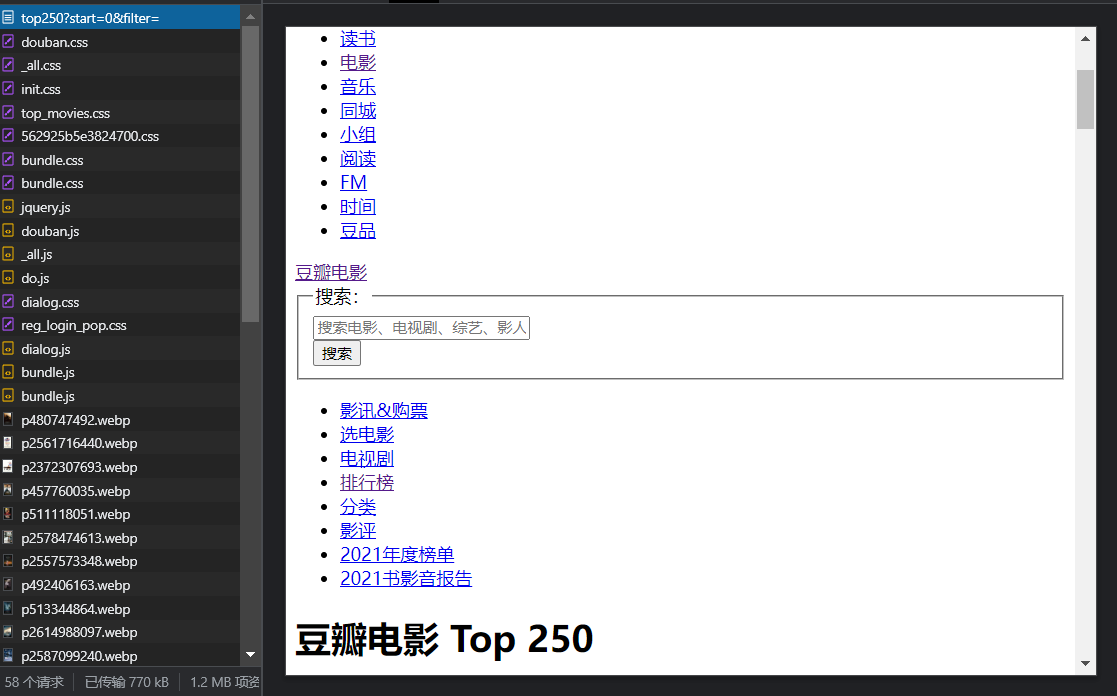
2、 Source code analysis
adopt F12 Debugging tools can get page data , namely , The data of this page , Stored in a class named grid_view Of ol Inside the label , At the same time, the class name is unique in the page , So we can use this node to locate our data , Traverse li label , Get content

3、 Content analysis

4、 Link analysis
"""
1. https://movie.douban.com/top250?start=0
2. https://movie.douban.com/top250?start=25
3. https://movie.douban.com/top250?start=50
n. https://movie.douban.com/top250?start=25*(n-1)
"""
urls = [https://movie.douban.com/top250?start=25*(i-1) for i in range(11)] # There is a total of 250 movie
so , We can use for loop , Or Mr. Cheng link , Use the form of stack to access , Or you can crawl the page recursively
Two 、 Write code
1、 Get every page url
# !/usr/bin/python3
# -*- coding: UTF-8 -*-
__author__ = "A.L.Kun"
__file__ = "123.py"
__time__ = "2022/7/6 10:19"
import requests, re # The import module
from lxml import etree # Conduct xpath analysis
from fake_useragent import UserAgent # Use random request headers
import pandas as pd # Import data parsing module fast
urls = [f'https://movie.douban.com/top250?start={25*(i-1)}' for i in range(10, 0, -1)] # Get all of url link , Store as global variable , Use the method of stack , So take the reverse order
headers = {
'Accept': 'text/html,application/xhtml+xml,application/xml;q=0.9,image/avif,image/webp,image/apng,*/*;q=0.8,application/signed-exchange;v=b3;q=0.9',
'Accept-Encoding': 'gzip, deflate, br',
'Accept-Language': 'zh-CN,zh;q=0.9',
'Cache-Control': 'no-cache',
'Connection': 'keep-alive',
'Host': 'movie.douban.com',
'Pragma': 'no-cache',
'sec-ch-ua': '"Not A;Brand";v="99", "Chromium";v="102", "Google Chrome";v="102"',
'sec-ch-ua-mobile': '?0',
'sec-ch-ua-platform': '"Windows"',
'Sec-Fetch-Dest': 'document',
'Sec-Fetch-Mode': 'navigate',
'Sec-Fetch-Site': 'none',
'Sec-Fetch-User': '?1',
'Upgrade-Insecure-Requests': '1',
'user-agent': UserAgent().random
}
lis_data = [] # Store the crawled data
while urls:
print(urls.pop())
2、 obtain ol Inside li label
def get_tags(url):
headers.update({'user-agent': UserAgent().random}) # bring user-agent It's random enough
resp = requests.get(url, headers=headers) # Send a request
resp.encoding = "utf-8" # Set encoding
tree = etree.HTML(resp.text) # Get the page source , hand etree
ol = tree.xpath('//*[@id="content"]/div/div[1]/ol/li') # Get ol
for li in ol:
print(li)
get_tags("https://movie.douban.com/top250?start=0")
3、 get data
def get_data(li):
imgSrc = li.xpath(".//img/@src")[0] # Picture links
try:
imgSrc = imgSrc.replace("webp", "jpg")
except Exception as e:
imgSrc = " Picture not found "
title = li.xpath(".//img/@alt")[0] # title
detailUrl = li.xpath(".//div[@class='hd']/a/@href")[0] # Detailed address
detail = li.xpath(".//div[@class='bd']/p[1]/text()") # It contains the director , year , type , We only need the year and type
time = re.search(r"\d+", detail[1]).group() # Year of publication
type_ = " ".join(re.findall(r"[\u4e00-\u9fa5]+", detail[1])) # Film type
score = li.xpath(".//span[@class='rating_num']/text()")[0] # Get the score
quote = li.xpath(".//span[@class='inq']/text()")[0] # Movie motto
# print(title, imgSrc, detailUrl, time, type_, score, quote) # Output the acquired data
lis_data.append({
" title ": title,
" Picture links ": imgSrc,
" Details page link ": detailUrl,
" Publication date ": time,
" Film type ": type_,
" score ": score,
" Maxim ": quote
}) # Store the results in a prepared container , Submit to pandas Library for parsing , Here you can also write data to the database
# Test use
resp = requests.get("https://movie.douban.com/top250?start=25", headers=headers)
resp.encoding = "utf-8"
tree = etree.HTML(resp.text) # Get the page source , hand etree
ol = tree.xpath('//*[@id="content"]/div/div[1]/ol/li') # Get ol
for li in ol :
get_data(li)
print(lis_data)
4、 Data cleaning
def parse_data():
df = pd.DataFrame(lis_data)
new_df = df.dropna() # Sure , Discard empty data
# At the same time, you can also do some chart analysis and other work , Let's omit
# print(new_df)
new_df.to_excel("./douban.xlsx", index=None)
parse_data()
3、 ... and 、 Complete code
# !/usr/bin/python3
# -*- coding: UTF-8 -*-
__author__ = "A.L.Kun"
__file__ = "123.py"
__time__ = "2022/7/6 10:19"
import requests, re # The import module
from lxml import etree # Conduct xpath analysis
from fake_useragent import UserAgent # Use random request headers
import pandas as pd # Import data parsing module fast
from logging import Logger
log = Logger(__name__)
urls = [f'https://movie.douban.com/top250?start={25*(i-1)}' for i in range(10, 0, -1)] # Get all of url link , Store as global variable , Use the method of stack , So take the reverse order
headers = {
'Accept': 'text/html,application/xhtml+xml,application/xml;q=0.9,image/avif,image/webp,image/apng,*/*;q=0.8,application/signed-exchange;v=b3;q=0.9',
'Accept-Encoding': 'gzip, deflate, br',
'Accept-Language': 'zh-CN,zh;q=0.9',
'Cache-Control': 'no-cache',
'Connection': 'keep-alive',
'Host': 'movie.douban.com',
'Pragma': 'no-cache',
'sec-ch-ua': '"Not A;Brand";v="99", "Chromium";v="102", "Google Chrome";v="102"',
'sec-ch-ua-mobile': '?0',
'sec-ch-ua-platform': '"Windows"',
'Sec-Fetch-Dest': 'document',
'Sec-Fetch-Mode': 'navigate',
'Sec-Fetch-Site': 'none',
'Sec-Fetch-User': '?1',
'Upgrade-Insecure-Requests': '1',
'user-agent': UserAgent().random
}
lis_data = [] # Store the crawled data
def get_data(li):
imgSrc = li.xpath(".//img/@src")[0] # Picture links
try:
imgSrc = imgSrc.replace("webp", "jpg")
except Exception as e:
imgSrc = " Picture not found "
title = li.xpath(".//img/@alt")[0] # title
detailUrl = li.xpath(".//div[@class='hd']/a/@href")[0] # Detailed address
detail = li.xpath(".//div[@class='bd']/p[1]/text()") # It contains the director , year , type , We only need the year and type
time = re.search(r"\d+", detail[1]).group() # Year of publication
type_ = " ".join(re.findall(r"[\u4e00-\u9fa5]+", detail[1])) # Film type
score = li.xpath(".//span[@class='rating_num']/text()")[0] # Get the score
try:
quote = li.xpath(".//span[@class='inq']/text()")[0] # Movie motto
except Exception as e:
quote = " There is no maxim for the time being !"
# print(title, imgSrc, detailUrl, time, type_, score, quote) # Output the acquired data
lis_data.append({
" title ": title,
" Picture links ": imgSrc,
" Details page link ": detailUrl,
" Publication date ": time,
" Film type ": type_,
" score ": score,
" Maxim ": quote
}) # Store the results in a prepared container , Submit to pandas Library for parsing , Here you can also write data to the database
def get_tags(url):
headers.update({'user-agent': UserAgent().random}) # bring user-agent It's random enough
resp = requests.get(url, headers=headers) # Send a request
resp.encoding = "utf-8" # Set encoding
tree = etree.HTML(resp.text) # Get the page source , hand etree
ol = tree.xpath('//*[@id="content"]/div/div[1]/ol/li') # Get ol
for li in ol:
get_data(li) # Get data
log.info(f"{url}, Data acquisition complete ")
def parse_data():
df = pd.DataFrame(lis_data)
new_df = df.dropna() # Sure , Discard empty data
# At the same time, you can also do some chart analysis and other work , Let's omit
# print(new_df)
new_df.to_excel("./douban.xlsx", index=None, encoding="utf-8")
# print(new_df)
def main():
while urls:
get_tags(urls.pop())
parse_data()
if __name__ == "__main__":
main()
